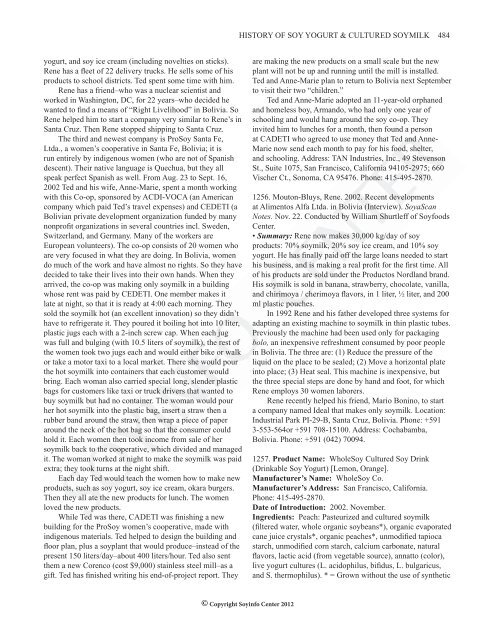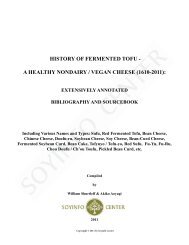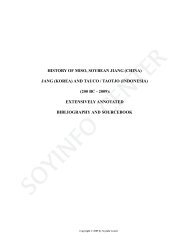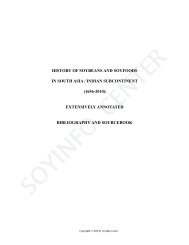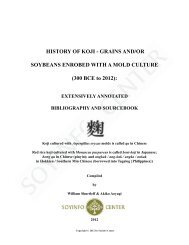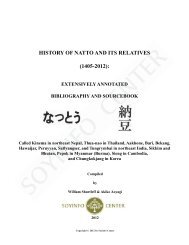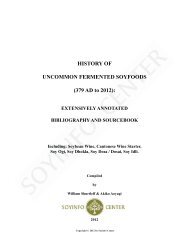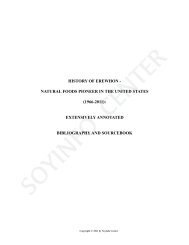history of soy yogurt, soy acidophilus milk and other ... - SoyInfo Center
history of soy yogurt, soy acidophilus milk and other ... - SoyInfo Center
history of soy yogurt, soy acidophilus milk and other ... - SoyInfo Center
You also want an ePaper? Increase the reach of your titles
YUMPU automatically turns print PDFs into web optimized ePapers that Google loves.
<strong>yogurt</strong>, <strong>and</strong> <strong>soy</strong> ice cream (including novelties on sticks).<br />
Rene has a fl eet <strong>of</strong> 22 delivery trucks. He sells some <strong>of</strong> his<br />
products to school districts. Ted spent some time with him.<br />
Rene has a friend–who was a nuclear scientist <strong>and</strong><br />
worked in Washington, DC, for 22 years–who decided he<br />
wanted to fi nd a means <strong>of</strong> “Right Livelihood” in Bolivia. So<br />
Rene helped him to start a company very similar to Rene’s in<br />
Santa Cruz. Then Rene stopped shipping to Santa Cruz.<br />
The third <strong>and</strong> newest company is ProSoy Santa Fe,<br />
Ltda., a women’s cooperative in Santa Fe, Bolivia; it is<br />
run entirely by indigenous women (who are not <strong>of</strong> Spanish<br />
descent). Their native language is Quechua, but they all<br />
speak perfect Spanish as well. From Aug. 23 to Sept. 16,<br />
2002 Ted <strong>and</strong> his wife, Anne-Marie, spent a month working<br />
with this Co-op, sponsored by ACDI-VOCA (an American<br />
company which paid Ted’s travel expenses) <strong>and</strong> CEDETI (a<br />
Bolivian private development organization funded by many<br />
nonpr<strong>of</strong>i t organizations in several countries incl. Sweden,<br />
Switzerl<strong>and</strong>, <strong>and</strong> Germany. Many <strong>of</strong> the workers are<br />
European volunteers). The co-op consists <strong>of</strong> 20 women who<br />
are very focused in what they are doing. In Bolivia, women<br />
do much <strong>of</strong> the work <strong>and</strong> have almost no rights. So they have<br />
decided to take their lives into their own h<strong>and</strong>s. When they<br />
arrived, the co-op was making only <strong>soy</strong><strong>milk</strong> in a building<br />
whose rent was paid by CEDETI. One member makes it<br />
late at night, so that it is ready at 4:00 each morning. They<br />
sold the <strong>soy</strong><strong>milk</strong> hot (an excellent innovation) so they didn’t<br />
have to refrigerate it. They poured it boiling hot into 10 liter,<br />
plastic jugs each with a 2-inch screw cap. When each jug<br />
was full <strong>and</strong> bulging (with 10.5 liters <strong>of</strong> <strong>soy</strong><strong>milk</strong>), the rest <strong>of</strong><br />
the women took two jugs each <strong>and</strong> would either bike or walk<br />
or take a motor taxi to a local market. There she would pour<br />
the hot <strong>soy</strong><strong>milk</strong> into containers that each customer would<br />
bring. Each woman also carried special long, slender plastic<br />
bags for customers like taxi or truck drivers that wanted to<br />
buy <strong>soy</strong><strong>milk</strong> but had no container. The woman would pour<br />
her hot <strong>soy</strong><strong>milk</strong> into the plastic bag, insert a straw then a<br />
rubber b<strong>and</strong> around the straw, then wrap a piece <strong>of</strong> paper<br />
around the neck <strong>of</strong> the hot bag so that the consumer could<br />
hold it. Each women then took income from sale <strong>of</strong> her<br />
<strong>soy</strong><strong>milk</strong> back to the cooperative, which divided <strong>and</strong> managed<br />
it. The woman worked at night to make the <strong>soy</strong><strong>milk</strong> was paid<br />
extra; they took turns at the night shift.<br />
Each day Ted would teach the women how to make new<br />
products, such as <strong>soy</strong> <strong>yogurt</strong>, <strong>soy</strong> ice cream, okara burgers.<br />
Then they all ate the new products for lunch. The women<br />
loved the new products.<br />
While Ted was there, CADETI was fi nishing a new<br />
building for the ProSoy women’s cooperative, made with<br />
indigenous materials. Ted helped to design the building <strong>and</strong><br />
fl oor plan, plus a <strong>soy</strong>plant that would produce–instead <strong>of</strong> the<br />
present 150 liters/day–about 400 liters/hour. Ted also sent<br />
them a new Corenco (cost $9,000) stainless steel mill–as a<br />
gift. Ted has fi nished writing his end-<strong>of</strong>-project report. They<br />
HISTORY OF SOY YOGURT & CULTURED SOYMILK 484<br />
© Copyright Soyinfo <strong>Center</strong> 2012<br />
are making the new products on a small scale but the new<br />
plant will not be up <strong>and</strong> running until the mill is installed.<br />
Ted <strong>and</strong> Anne-Marie plan to return to Bolivia next September<br />
to visit their two “children.”<br />
Ted <strong>and</strong> Anne-Marie adopted an 11-year-old orphaned<br />
<strong>and</strong> homeless boy, Arm<strong>and</strong>o, who had only one year <strong>of</strong><br />
schooling <strong>and</strong> would hang around the <strong>soy</strong> co-op. They<br />
invited him to lunches for a month, then found a person<br />
at CADETI who agreed to use money that Ted <strong>and</strong> Anne-<br />
Marie now send each month to pay for his food, shelter,<br />
<strong>and</strong> schooling. Address: TAN Industries, Inc., 49 Stevenson<br />
St., Suite 1075, San Francisco, California 94105-2975; 660<br />
Vischer Ct., Sonoma, CA 95476. Phone: 415-495-2870.<br />
1256. Mouton-Bluys, Rene. 2002. Recent developments<br />
at Alimentos Alfa Ltda. in Bolivia (Interview). SoyaScan<br />
Notes. Nov. 22. Conducted by William Shurtleff <strong>of</strong> Soyfoods<br />
<strong>Center</strong>.<br />
• Summary: Rene now makes 30,000 kg/day <strong>of</strong> <strong>soy</strong><br />
products: 70% <strong>soy</strong><strong>milk</strong>, 20% <strong>soy</strong> ice cream, <strong>and</strong> 10% <strong>soy</strong><br />
<strong>yogurt</strong>. He has fi nally paid <strong>of</strong>f the large loans needed to start<br />
his business, <strong>and</strong> is making a real pr<strong>of</strong>i t for the fi rst time. All<br />
<strong>of</strong> his products are sold under the Productos Nordl<strong>and</strong> br<strong>and</strong>.<br />
His <strong>soy</strong><strong>milk</strong> is sold in banana, strawberry, chocolate, vanilla,<br />
<strong>and</strong> chirimoya / cherimoya fl avors, in 1 liter, ½ liter, <strong>and</strong> 200<br />
ml plastic pouches.<br />
In 1992 Rene <strong>and</strong> his father developed three systems for<br />
adapting an existing machine to <strong>soy</strong><strong>milk</strong> in thin plastic tubes.<br />
Previously the machine had been used only for packaging<br />
bolo, an inexpensive refreshment consumed by poor people<br />
in Bolivia. The three are: (1) Reduce the pressure <strong>of</strong> the<br />
liquid on the place to be sealed; (2) Move a horizontal plate<br />
into place; (3) Heat seal. This machine is inexpensive, but<br />
the three special steps are done by h<strong>and</strong> <strong>and</strong> foot, for which<br />
Rene employs 30 women laborers.<br />
Rene recently helped his friend, Mario Bonino, to start<br />
a company named Ideal that makes only <strong>soy</strong><strong>milk</strong>. Location:<br />
Industrial Park PI-29-B, Santa Cruz, Bolivia. Phone: +591<br />
3-553-564or +591 708-15100. Address: Cochabamba,<br />
Bolivia. Phone: +591 (042) 70094.<br />
1257. Product Name: WholeSoy Cultured Soy Drink<br />
(Drinkable Soy Yogurt) [Lemon, Orange].<br />
Manufacturer’s Name: WholeSoy Co.<br />
Manufacturer’s Address: San Francisco, California.<br />
Phone: 415-495-2870.<br />
Date <strong>of</strong> Introduction: 2002. November.<br />
Ingredients: Peach: Pasteurized <strong>and</strong> cultured <strong>soy</strong><strong>milk</strong><br />
(fi ltered water, whole organic <strong>soy</strong>beans*), organic evaporated<br />
cane juice crystals*, organic peaches*, unmodifi ed tapioca<br />
starch, unmodifi ed corn starch, calcium carbonate, natural<br />
fl avors, lactic acid (from vegetable source), annatto (color),<br />
live <strong>yogurt</strong> cultures (L. <strong>acidophilus</strong>, bifi dus, L. bulgaricus,<br />
<strong>and</strong> S. thermophilus). * = Grown without the use <strong>of</strong> synthetic


